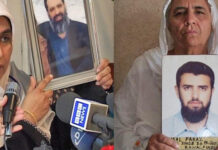![]() Babar Ahmad was released in July 2015 after spending 11 years in prison in both the UK and the US. You can read his blog here.
Babar Ahmad was released in July 2015 after spending 11 years in prison in both the UK and the US. You can read his blog here.
Former detainee Babar Ahmad says that even when you are at your very lowest point never give up hope in God’s promise.
Here I am standing next to my dad at Lords’ Cricket Ground in London on Friday 15 July 2016 watching Pakistan play England to fulfill a promise I made to myself during my darkest hour in prison three years ago.
Three years ago, in the summer of 2013, I was living in solitary confinement at a Supermax prison in Connecticut, United States. At the time, it had been almost a year since I was extradited from the UK to the US.
My regime after I arrived at the prison consisted of isolation for 23-24 hours a day in a cell that was five paces long and two paces wide. I would be subjected to a full strip search every time I left my cell, even to use the shower.
Every time I left my cell I would be placed in “full restraints.” This meant that my hands would be handcuffed behind my back and my legs would be shackled, with a chain linking the handcuffs to the shackles so I could not stand up straight.
I was permitted three 15-minute showers a week in a locked shower cubicle. While showering, guards would remove the handcuffs but leave the leg shackles on.
Subscribe to our newsletter and stay updated on the latest news and updates from around the Muslim world!
“Recreation” was an hour a day from Monday to Friday. It consisted of spending 60 minutes in a dog cage built in an underground concrete pit that was five paces long and two paces wide.
While in my cell the only meaningful communication I had with other human beings was by speaking with other prisoners through the cell ventilation shaft or washbasin drainage holes.
My lowest point
In a five minute video clip taken from a recent interview I gave to the BBC, I talk about the two years I spent in this Supermax prison. I describe my time there as “the darkest years of my life.”
One day during the summer of 2013, while I was at my lowest point, I took out a piece of paper and a pen and wrote a “bucket list” of things that I wanted to do when I left prison.
At the time I wrote this list, I had no idea when, or if, I would ever leave prison alive. I had no idea when, or if, I would ever meet my family as a free man.
I wrote down people I wanted to meet, places I wanted to visit and things I wanted to do after I was released. I wrote down foods I wanted to eat, sights I wanted to see and experiences I wanted to have after I was released.
One of the items on the list was: “Watch a cricket match with my dad before he dies.”
Why the significance of cricket? For those unenlightened souls among you who don’t know what cricket is, it is an eccentric game invented by the English in the 18th century.

The British Empire later spread cricket to nations of the British Commonwealth such as Pakistan, India and the South Africa.
Today, cricket is more popular in these countries than England itself.
For example, it is said that there are two religions in Pakistan: cricket, and Islam (in that order). My dad happens to be a devout follower of both of these religions.
When I was growing up my dad used to be a freelance cricket reporter. This meant that as a young boy of 12, I would accompany him to cricket matches all over England.
Although I soon grew out of attending the matches, I retained an interest in the sport and continued to discuss the sport with him
Meanwhile, my dad has continued his love of cricket, including throughout the 11 years that he campaigned for me to come home. Therefore, it was only natural that one of the items on my bucket list was to watch a cricket match with him after I was released.
It begs repeating that at the time I wrote this list, I had no idea when, or if, I would ever leave prison. I had no idea whether God would grant my dad life to see the day that I came home, let alone watch a cricket match with me.
Last week, out of the blue, a friend called my dad, two days before the first anniversary of my release from prison in 2015. He said that he had a pair of free tickets worth £100 each for me and my dad to watch Pakistan play England at Lord’s, the most famous cricket ground in the world, also known as “the home of cricket.
This friend had no idea that watching a cricket match with my dad was one of the items on my bucket list, or indeed that I had written such a bucket list.
And so, last Friday I accompanied my dad to Lord’s to watch a cricket match with him for the first time in 30 years. The expression on his face in the photograph says it all, to Allah be praise.
Why am I sharing this story?
Man cannot live without hope. Hope that tomorrow will be better than today. All the prophets of God, from Adam to Noah to Abraham, from Moses to Jesus to Muhammad (peace be upon them all) taught their people to be optimistic about the future.
It is no virtue being optimistic about the future when everything in your life is good. The virtue of optimism lies in finding hope when you are at your lowest point.
The reality facing me three years ago was that I was to spend the rest of my life in solitary confinement, in a foreign country far from home.
But I refused to accept this reality and instead I believed in God’s promise, that no hardship lasts forever, that every hardship is followed by ease. And God did not disappoint me.
So whatever personal struggles you are going through in your life, whether sickness, domestic violence or poverty. Whether worries about your children or marriage or debt. Whether disability or instability… Always be optimistic about the future.
Always believe in God’s promise that tomorrow will be better than today.
And just like He never disappointed me, He will never disappoint you. Never.
This article first appeared on Babar’s personal blog. You can read his full story in the interview he gave to The Guardian newspaper here.










![24 Hour Road Trip Through Free Syria [Short Film]](https://5pillarsuk.com/wp-content/uploads/2025/02/IMG_5907-218x150.jpg)











